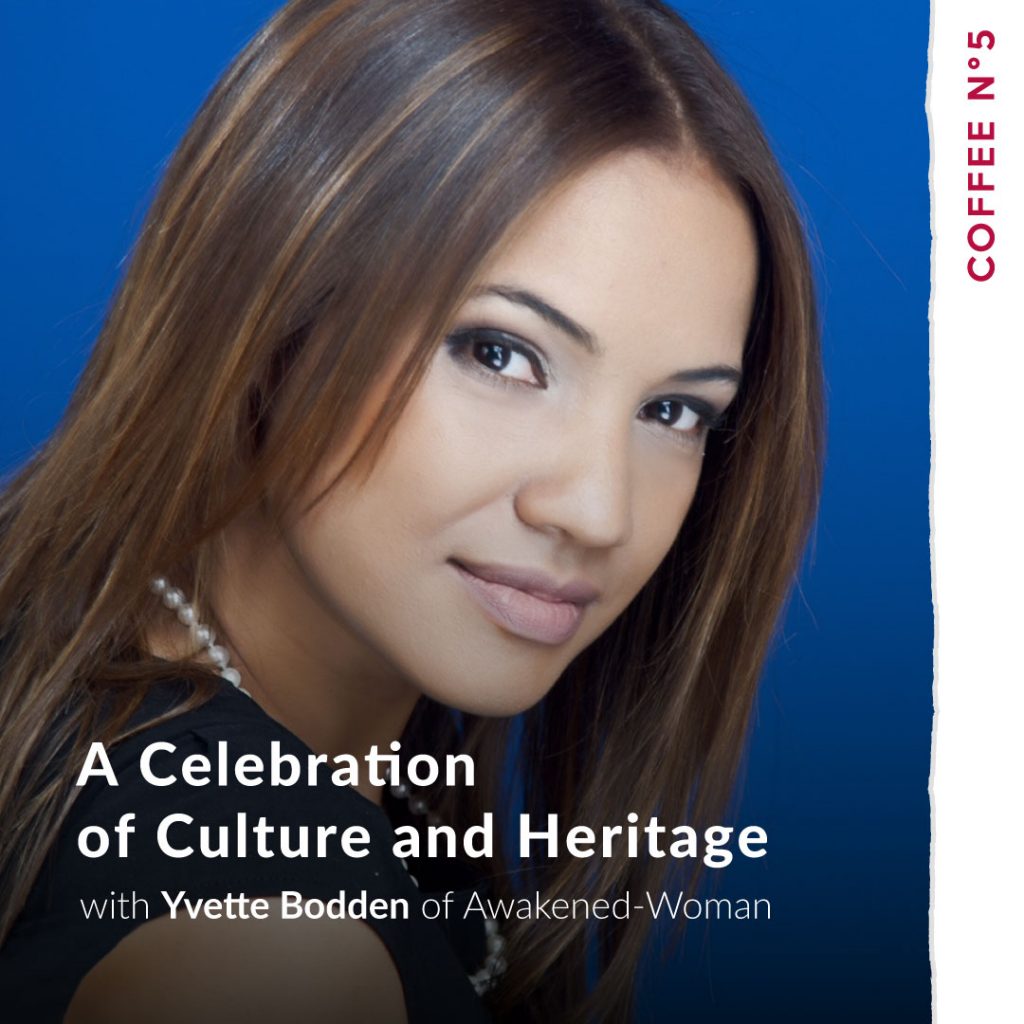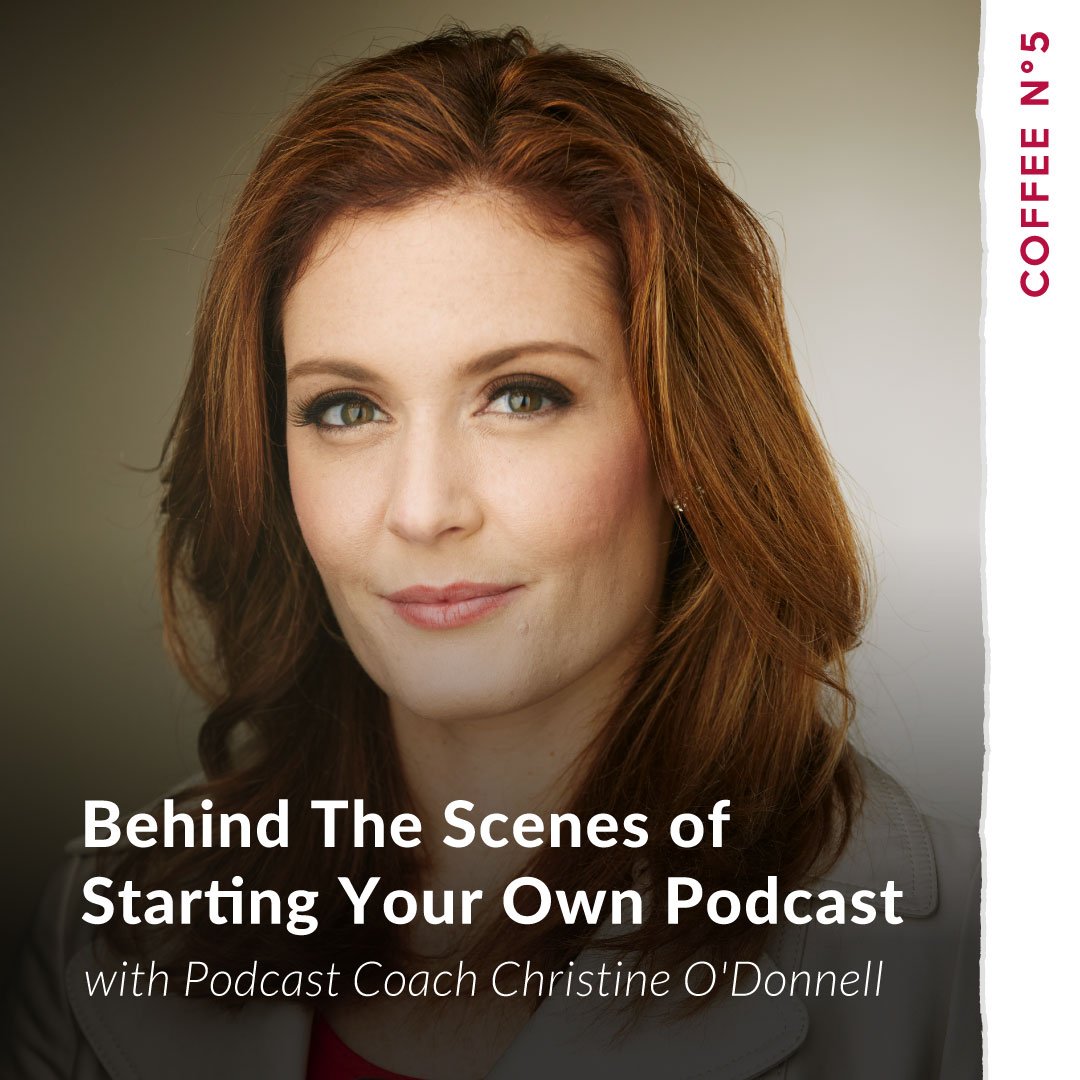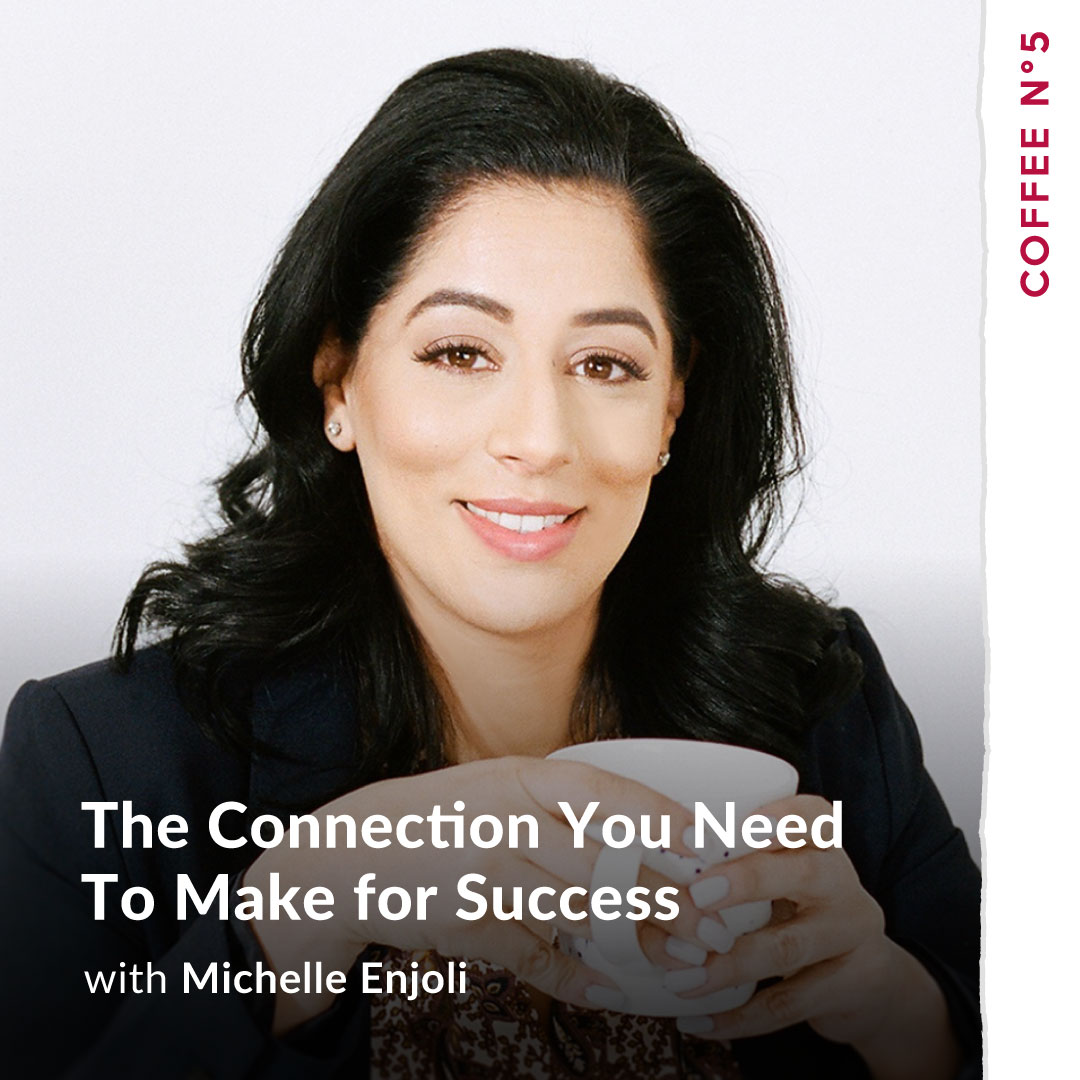Episode 66 – Coffee N.5 – A Celebration of Culture and Heritage with Yvette Bodden
Lara Schmoisman 0:05
This is Coffee N5. I’m your host, Lara Schmoisman. Hello, everyone. Welcome back to Coffee N5. And today, I was thinking a little bit about ethnicity and who I am. Last night, I was talking to my cousin who was my best friend growing up, and she’s living in Israel right now. And for many years, we had conversations in different parts of the world at different parts of the day while I’m having dinner, or preparing dinner. She’s starting very early in the day, and those are the only moments that we can connect. And even though we are so far apart in the world, in different cultures, we also have so much in common, besides the genetics, which those are given. We have culture, we have traditions, we have our Jewish traditions, but also we have our Latin traditions. And that makes us who we are, and what we eat. Yeah, what we eat is huge for Latin, and so important. And so today, I was thinking about all these cultures and I want to invite someone who has a similar experience with me, because I love to discuss and talk about ethnicity and how it affects us in our business. She’s a well known journalist, and I want to invite her to introduce herself. So welcome Yvette Bodden. I hope I said it right.
Yvette Bodden 1:40
Thank you so much, Lara, for having me. I’m really excited. And I think this is such an important topic. And I’m glad that I can share with someone who shares my experience. I was born and raised in New York, I have a daughter who was also born and raised in New York. And I shared a lot of the traditions that my mother passed, my mother and my father passed on to me. But you know, there’s still that there’s still that element of, you know, she is American. But really, she embraces the fact that she is a Latina, from, you know, other American households, which is something that I had trouble with growing up, because I was trying to, you know, balance the fact that I was born in the United States. But you know, when I went home, my parents were Dominican, and, you know, we listened to Latino music, we ate Dominican food. So I was more trying to balance and figure out what my true identity was. And as it turns out, you can be both and you can have that balance. So I was able to pass that on to my daughter, which it’s been a gift for me.
Lara Schmoisman 2:57
For me it is such a unique experience because in my case, my husband is from the Middle East and I’m from Argentina, and we met here in LA and my kids are all over the place. They’re American, but they have all this mix of cultures. And I think it makes it amazing that they can embrace everything, but I found that society at the same time, are always trying to label them and they don’t fit in a box because they’re such a mix of cultures. And even if I wouldn’t, I mean living in a city like LA or New York, and if you just embrace the city and you meet all these people. It’s incredible what you can learn and you become something else.
Yvette Bodden 3:42
Well, I’m sure you’ve heard New York is a melting pot. And you know, I’ve been able to surround myself with so many different cultures and appreciate it. But I agree with you, there is um, it’s almost like a need for society to put labels on us. If we’re Latino, we’re Afro Latina, we’re, you know, Latino, American with there’s so many labels, and at the end of the day, we are all Latinos, we should, you know, embrace that and share the differences in a way that promotes positivity, not you know, takes away from our Latina but, you know, I’ve as I’ve grown, you know, to be the woman I’m meant to be, I have just progressively embrace. You know, the fact that I am Latina, and I am American, and I love it, I wouldn’t have it any other way. I love the fact that I can be both, and I’m proud of it.
Lara Schmoisman 4:43
I want to talk to you about business now. Because you’re a businesswoman. I’m a businesswoman, and I had to learn to translate myself, mostly to business in English because I work here in the United States for such a long time that I’m used to working in English. But then I found myself doing this podcast in English, I wanted to do something for the Latin community that wasn’t out there. So I started a podcast in Spanish called marketing simplificado. Oh, and I will do everything that I do now, emails, everything bilingual. But I also realized that I have to speak to my audience differently. It’s not the same way that we speak English that we speak Spanish, we communicate differently. And for you, it’s very similar because you work in English, but you feature a lot of Latin community and stories. So how do you make these two cultures and this voice merge?
Yvette Bodden 5:52
You know, what’s really funny that you mentioned that? When I saw the awakened woman has articles in both English and Spanish, the English articles just picked up more attraction. So over time, I started doing more of the English when I write in Spanish, and I know this is a, you know, maybe you can relate, I literally think in Spanish. No, you can’t. And it’s funny because people think, well, you take the English and you translate it. No, no. Even if you were to google translate a document. It’s not the same, you don’t capture the language in the same way. So I physically sit there and think in Spanish, and write in Spanish. It’s literally a change in my mindset.
Lara Schmoisman 6:47
Yeah, it’s a switch.
Yvette Bodden 6:48
Yes, yes.
Lara Schmoisman 6:49
I always say that you understand the culture, to be honest with you, when I didn’t speak English, because everyone knows that I’m self taught. And when I moved to this country I didn’t speak a word of English, I didn’t understand what Americans were laughing about. And I honestly believe that you cannot understand a culture or language until you understand how they laugh.
Yvette Bodden 7:18
Interesting. How they laugh.
Lara Schmoisman 7:22
Yes, or what they laugh about, because I don’t find the same things funny in English or Spanish. My mind has a switch
Yvette Bodden 7:31
That is true. You’re right. I never thought about it. But you’re right. That’s really interesting. How did you come to that conclusion? It’s curious. It’s really cool. I never thought about it.
Lara Schmoisman 7:47
I don’t know how it came up. I just have my team from all over the world. And I have met a lot of Latin people and I realized that many times, I’m joking around in Spanish with them. And it’s not something that I will find funny doing in English, or vice versa, like I’m talking to my team in English, and we laugh, and we make jokes that will never work in Spanish.
Yvette Bodden 8:19
You know what, that is a good point. There have been moments when I’ll say something funny in English, and I will be asked Oh, can you translate it in Spanish? It sounds you know, it sounds funny or it sounds interesting. it does not hit the note. It does not hit the same.
Lara Schmoisman 8:37
is not it’s not even with expressions. Like I remember, my kid was very little and he had a mix of three languages back then. And my mom said, an expression in Spanish “voy volando’. I’ll go off. It means I’ll be there really fast. But literally you will translate it like i’ll go flying. And so my son understood literally what he was saying because he will speak Spanish so he looked at the sky. and looked at his grandma, like Is she a superhero? What?
Yvette Bodden 9:17
you’re right, that is really interesting. I guess maybe I took it for granted or I didn’t really, you know, stop and think about it. But you’re right. There are many things that cannot be translated and hit the note that is meant to hit.
Lara Schmoisman 9:37
And I think this is where I want to bring this conversation today. We live in a world right now that is so multi ethnic, even though you speak in English or you write in English or you write in Spanish. And in Spanish, we have so many different slangs and so many different spanishes that you’ll have to speak in a neutral Spanish to make sure that they understand, actually one person from my team from Colombia, She has a list of words you can’t say in another Spanishes,
Yvette Bodden 10:11
I know, what do you what are you talking about
Lara Schmoisman 10:15
She has another another list like a dictionary from other Spanishes
Yvette Bodden 10:22
Because I remember as a young girl, you know, but there was a word that I would use, my mother is Dominican, but she also has Puerto Rican influence. And I read that even with Dominicans, and Puerto Rican, there are certain words that you cannot use, they’re just not. They mean something different for each, for each culture. So it’s a lot of fun when you find those things, those little things among the different line cultures. But unless you are a Latina or Latino, you wouldn’t understand
Lara Schmoisman 11:07
Totally. And I found myself even when I write you know that in English, we always say that we want to be politically correct. And that’s a whole different conversation that I am just so sick and tired of all the time. But my thing is that I find myself trying to be multicultural, correct, that everyone that I write that my niche, and when you write, it happens to you too for sure you know who your niche is, but my niche doesn’t discriminate age, or gender, or race. But I want everyone to understand and there are some experiences that we all have the same, which has processed them differently, because we laugh about different things.
Yvette Bodden 11:59
Absolutely. And you know, I think in 2021, that is even more that has even more of an impact. There are certain things even in the English language that you shouldn’t say or they’re, you know, you have to be very careful about how you phrase things, and what words you use, there’s definitely a lot of political correctness. So even within the English language, I think it’s become an issue. Would you agree?
Lara Schmoisman 12:31
Totally. My question is you as a journalist, and working with all these profiles, or multi ethnic profiles, and how in the English word, which is, it’s amazing, and I love to write, but sometimes it’s so hard to transfer that message. And those little idiosyncrasies that include part of the cultural background, how can you translate that because I see that you feature mostly like, Latin community, so you find yourself trying to explain or translate?
Yvette Bodden 13:14
Oh, wow, that’s a great question. Um, you know, when I interviewed these amazing people, amazing women, I try not to look at it from a cultural perspective, I try not to label the person in front of me, I honestly look at the person as a human being, and try to translate their message in a way that everyone can relate no matter where they come from, I think it’s more about sort of removing that label and forgetting about, you know, whether they’re from one part of the world or another and just looking at them as a human being, I try to take off those labels and because I think that is one of the issues we have in society, we focus so much on, you know, labels, who the person is, what their name is, what their background is, what they look like, what they, you know, what their status is, financially, and education. There’s so many labels that we place and when I read these articles, I want to remove all these labels, and just sort of humanize the person in front of me, if that makes any sense.
Lara Schmoisman 14:39
That’s what I love about your writing because I can totally see that you really care about the human being. And that’s why I’m trying to get tips from your process of writing because you do such a good job writing about the person behind the story. And I see that that’s really important to you, but at the same time How did you process all this background and cultural background and include it into the story? What is your process? What is important for you to tell how much impact their background makes in a person?
Yvette Bodden 15:17
Well, I think one of the biggest things for me is highlighting the positive and extracting, And I keep using that word, because it’s so important to me, if I can extract the human side of a story, it’s easier for readers to empathize, to connect with my story. So I really try not to focus too much on, you know, where the person comes from. Because in an ideal world, I mean, I know it’s probably not realistic, but we are all connected. And these stories that I write are to sort of support that idea that we’re connected, we’re all human at the end of the day. And I truly want to extract, you know, the story in a way that other people can empathize and connect.
Lara Schmoisman 16:17
I cannot appreciate enough and thank you enough for being here, and for being so candid, and giving us all these answers. But at the end of the day, I always think that we learn a lot in our journeys, and you definitely have your very unique journey. But we also learn from our mistakes. And something new, I said a little while ago. I ask my guests if they can tell us one mistake that they made and what they learned from that.
Yvette Bodden 16:51
I’ve made so many. What mistake have I made?
Lara Schmoisman 17:00
and that others can learn from them
Yvette Bodden 17:03
Well, this is really personal. But I think a lot, particularly women, I’m sure there’s men out there that can connect. But I think one of the biggest mistakes I’ve made with myself is not not giving myself the worth that I deserve. I think a lot of decisions that I’ve made a lot of challenges that I’ve had are because I haven’t valued myself enough. That’s been a huge mistake. But I’ve learned that it’s never too late. It’s never too late to learn your value and embrace who you are. And give yourself that worth. It’s really been a gift to go from not knowing, not having any self worth to falling in love with myself and understanding that I have many gifts to offer. So that would definitely be my biggest mistake. But I’ve learned a lot from it.
Lara Schmoisman 18:17
That’s amazing, thanks. Thank you so much for sharing and for having coffee with me in coffee N5. Everyone who is listening to the show today, we’re gonna leave all Yvettes notes and how to find her and follow her. People embrace who you are. Believe in yourself. Find a way to love yourself because the rest will come.
Yvette Bodden 18:45
Totally agree. Thank you so much for having me.
Lara Schmoisman 18:48
See you next week. It was so good to have you here today. See you next time. catch you on the flip side. Ciao ciao.








